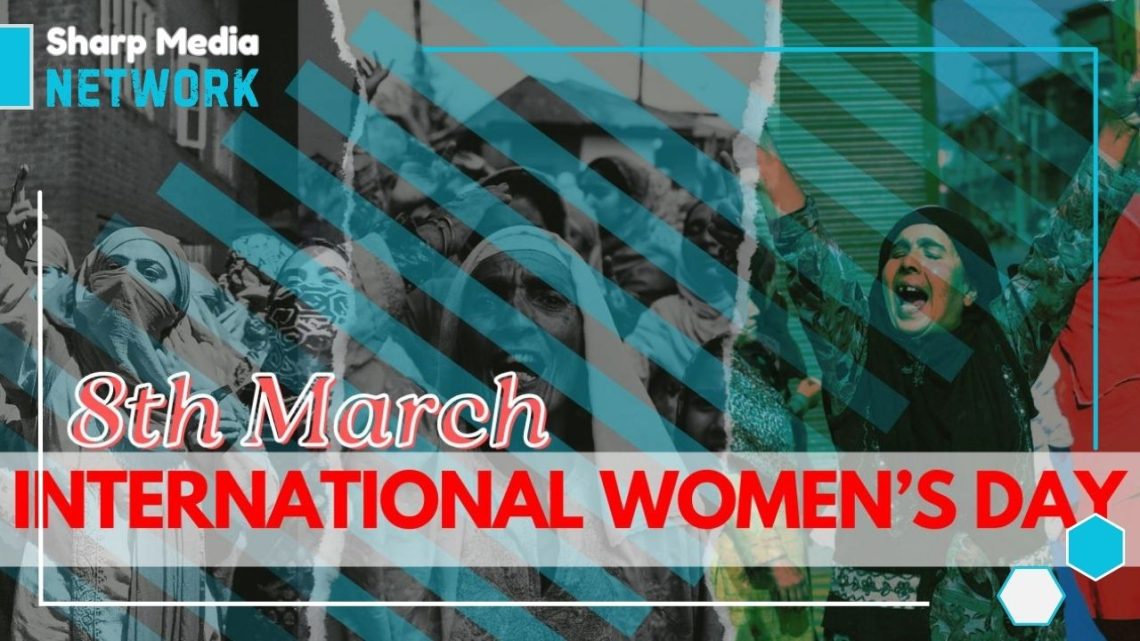
Int’l Women’s Day: A Call for Justice Amidst Ongoing Violence Against Kashmiri Women in IIOJK
March 8, 2025As the world observes International Women’s Day on Today on March 8, the grim reality for countless women in IIOJK and India remains one of relentless violence, abuse, and systemic neglect, with little progress in addressing their suffering.
International Women’s Day, today, serves as a global platform to celebrate the achievements and contributions of women across the world, but it also casts a harsh light on the persistent inequalities and violence that women continue to face in many regions. India, despite its growing global prominence, remains one of the most dangerous countries for women, with shocking levels of gender-based violence and systemic discrimination against women. This harsh reality is particularly evident in Indian Illegally Occupied Jammu and Kashmir (IIOJK), where the suffering of women has been compounded by the ongoing conflict and military occupation.
Under Prime Minister Narendra Modi’s leadership, India has seen a disturbing rise in crimes against women, which has brought international attention to the country’s inability to safeguard women’s rights. India now holds the unfortunate distinction of leading the world in cases of rape and gender-based violence. According to reports, a rape occurs every 16 minutes in India, and a woman is gang-raped every 30 hours. These staggering statistics reflect the severity of the violence and highlight the failure of the state to provide safety and justice for its female population.
New Delhi, the capital city, has gained the infamous title of the “rape capital of the world,” with thousands of cases of sexual assault, many of which go unreported. This is partly due to societal stigma, deeply ingrained patriarchal attitudes, and a justice system that often fails to deliver justice to the victims. In many instances, women who dare to speak out against their perpetrators face public shaming, harassment, and further victimization.
The suffering of women in India is compounded by the brutal actions of the Indian military in IIOJK. Since the start of the Kashmir conflict in 1989, the Indian military has subjected over 11,000 Kashmiri women to mass rape and sexual violence as part of their strategy to suppress the region’s struggle for self-determination. These acts of sexual violence have been described by human rights organizations as a form of “war rape,” a tool used to terrorize and demoralize the population. The reports highlight the ongoing atrocities, shedding light on the systematic sexual violence carried out by Indian troops in the region.
In addition to rape, thousands of Kashmiri women have been widowed as a result of the conflict, with many left in a state of limbo as “half-widows” due to the forced disappearance of their husbands by Indian forces. These women live in constant uncertainty, unsure of whether their loved ones are dead or alive, enduring psychological trauma that often lasts a lifetime.
Advocates for Kashmiri rights, including leaders from the All Parties Hurriyat Conference (APHC), have condemned India’s failure to address the violence faced by women in IIOJK, calling it a deliberate attempt to crush the aspirations of the Kashmiri people. Advocate Abdul Rashid Minhas, the spokesperson for APHC, condemned the use of rape as a weapon of war, emphasizing that with over one million Indian troops deployed in the region, the lives of Kashmiri women and children have been turned into a “living hell.”
On this International Women’s Day, it is crucial to recognize that the suffering of women in India and IIOJK is not just an isolated issue but a global crisis that demands attention and urgent action. The international community must stand in solidarity with the women of India and Kashmir and hold the Indian government accountable for its failure to protect the rights and dignity of women. International organizations, human rights defenders, and policymakers must push for tangible actions that address the systemic issues causing such widespread violence against women.
In addition to the ongoing violence, women in India face numerous other challenges, including limited access to education, healthcare, and economic opportunities. Despite India’s growing global influence, gender inequality remains a significant barrier to progress for millions of women. Empowerment and equality are not just about celebrating achievements; they are about creating a society where women can live free from fear, violence, and oppression.
On this International Women’s Day, the world must commit to standing up for the rights of women everywhere, particularly those who are suffering in conflict zones like Kashmir. It is time for the global community to take decisive action to end the violence, demand justice for the victims, and ensure that women are not treated as second-class citizens but are afforded the dignity and respect they deserve.

